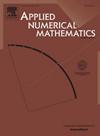A priori and a posteriori error estimates for efficient numerical schemes for coupled systems of linear and nonlinear singularly perturbed initial-value problems
IF 2.2
2区 数学
Q1 MATHEMATICS, APPLIED
引用次数: 0
Abstract
This work considers the numerical approximation of linear and nonlinear singularly perturbed initial value coupled systems of first-order, for which the diffusion parameters at each equation of the system are distinct and also they can have a different order of magnitude. To do that, we use two efficient discretization methods, which combine the backward differences and an appropriate splitting by components. Both a priori and a posteriori error estimates are proved for the proposed discretization methods. The developed numerical methods are more computationally efficient than those classical methods used to solve the same type of coupled systems. Extensive numerical experiments strongly confirm in practice the theoretical results and corroborate the superior performance of the current approach compared with previous existing approaches.
求助全文
约1分钟内获得全文
求助全文
来源期刊

Applied Numerical Mathematics
数学-应用数学
CiteScore
5.60
自引率
7.10%
发文量
225
审稿时长
7.2 months
期刊介绍:
The purpose of the journal is to provide a forum for the publication of high quality research and tutorial papers in computational mathematics. In addition to the traditional issues and problems in numerical analysis, the journal also publishes papers describing relevant applications in such fields as physics, fluid dynamics, engineering and other branches of applied science with a computational mathematics component. The journal strives to be flexible in the type of papers it publishes and their format. Equally desirable are:
(i) Full papers, which should be complete and relatively self-contained original contributions with an introduction that can be understood by the broad computational mathematics community. Both rigorous and heuristic styles are acceptable. Of particular interest are papers about new areas of research, in which other than strictly mathematical arguments may be important in establishing a basis for further developments.
(ii) Tutorial review papers, covering some of the important issues in Numerical Mathematics, Scientific Computing and their Applications. The journal will occasionally publish contributions which are larger than the usual format for regular papers.
(iii) Short notes, which present specific new results and techniques in a brief communication.
 求助内容:
求助内容: 应助结果提醒方式:
应助结果提醒方式:


